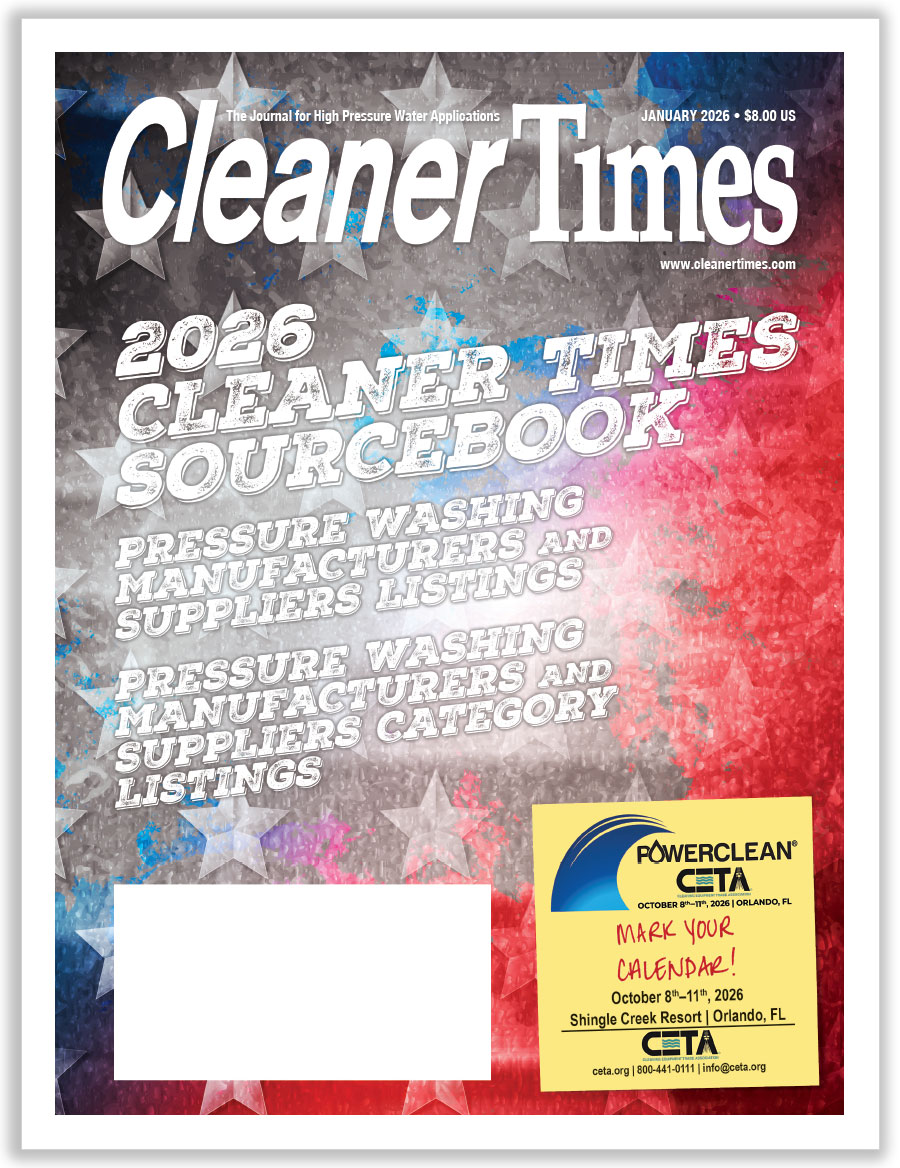
Financial
Avoiding Potential Payroll Pitfalls
By Mark E. Battersby / Published July 2019

Payroll taxes withheld by employers account for nearly 72 percent of all revenue collected by the IRS. Emphasizing how important payroll taxes are, IRS Commissioner Charles “Chuck” Rettig recently issued a stern warning against employment tax fraud.
Employment tax fraud occurs when a pressure washing business withholds federal income tax from employees’ pay but fails to send it to the IRS. Employers know or should know the rules—they must deduct, deposit, and report employment taxes accurately. As with all taxes, however, the road is not always a smooth one.
Payroll Taxes
Payroll taxes are taxes imposed on employers or employees and are usually calculated as a percentage of the wages or salaries paid. Payroll taxes generally fall into two categories: deductions from an employee’s wages, and taxes paid by the employer based on the employee’s wages. Federal payroll taxes cover Social Security and Medicare contributions, which constitute the Federal Insurance Contributions Act (FICA) tax.
Usually an employer is responsible for funding unemployment insurance. The rate of unemployment insurance the employer will pay varies not only by industry, but by state and by federal fees. There are also some states that require the employee to contribute to unemployment and disability insurance.
While some of these taxes are not payable by a pressure cleaning business, they must be collected as withholding and turned over to the IRS. There is a legal presumption that when a partial payment of these withheld taxes is made to the IRS, the corporate or business portion is being paid and the employee-withheld portion has been retained. It is the “unlawful retention” that forms the basis for the whopping 100 percent penalty tax—a penalty tax that accrues additional penalties and interest the longer it goes unpaid.
The Penalties
When those payroll taxes due the government are not paid, paid late, or paid but don’t follow the correct guidelines, employers can face severe penalties as well as accrue interest. Utilizing a payroll service eliminates the worries about submission guidelines, accuracy of payment, and getting payroll taxes paid on time. However, monitoring of the payroll service is important.
Failure to comply with any of the three components of direct deposits in timeliness, accuracy, and proper manner subjects an employer to the dreaded Failure to Deposit (FTD) penalty. The actual penalty amount depends on the number of calendar days the deposit is late or whether there is a direct payment. However, as of 2017, about 6.9 million employers had failed to pay those taxes and were slapped with more than $7 billion in penalties. These unpaid payroll taxes, fines, and even property seizures have created a “blame game.”
The Expensive Blame Game
One of the nastiest and most feared taxes currently imposed is the “Trust Fund Penalty Tax,” a whopping 100 percent penalty on payroll taxes withheld from a pressure cleaning business’s employee but not forwarded to the federal government.
When the pressure washing operation pays its employees’ salaries, they must withhold payroll taxes and deposit those funds with the IRS. The funds are held in trust for the IRS and if not paid over are considered to be stolen by the business. While a lot of businesses don’t have the money withheld or their share of payroll taxes, the pressure cleaning business remains liable for those taxes. The IRS has the authority to seize and sell the assets of that business.
Even worse, if the business is unable to pay or can’t pay within the timeframe the IRS demands, liability for paying can fall on the individuals responsible for the nonpayment. That’s right, the IRS can make key employees personally responsible for most of the unpaid payroll taxes. They can then seize and sell the personal assets of those individuals to pay the payroll tax liabilities of the business.
How does the IRS define “responsible person”? According to the IRS, responsible persons include the following:
- Officers or employees of the incorporated business
- Members or employees of partnerships
- Corporate directors or shareholders, and
- Other individuals with authority and control over funds to direct their disbursement
Spouses who jointly own and operate a business and share in the profits and losses are considered partners in a partnership, regardless of whether there is a formal partnership agreement. The partnership is considered the employer of any employees and is liable for any employment taxes due on wages paid to its employees.
Mistakes, We Have Mistakes
Taxes, especially payroll taxes, are among the most complex, confusing, and important problems faced by pressure cleaning business owners and managers. Every employer must ensure the correct amount of taxes are withheld from employees’ paychecks as well as understand the contributions they are required to make.
There are also state and local requirements where deposit and reporting dates should be checked. Late payments may come with penalties and accrued interest from local, state, and federal agencies. Naturally, every business should be registered with the proper authorities and tax identifying numbers obtained.
Depending on whether an employee quits or is fired, there are a number of states that require employers to give the departing employee his or her final paycheck in a fairly short period of time. Even if no employee departures are anticipated, planning ahead can avoid those costly penalties.
Owners, managers, and executives of both large and small pressure cleaning businesses dread the thought of audits. Should an audit occur, good business records, especially payroll records, can help with survival. An employer is required to retain payroll records for at least three years. Some states require those records to be held even longer.
And, don’t forget the other potential payroll problems. The Fair Labor Standards Act (FLSA), for example, requires the payment of a premium for overtime. Calculating overtime can be confusing since state and local wage and hour laws may come into play. The old standard of “anything over 40 hours in a week” being considered as overtime has, in many instances, been usurped by daily overtime (one and a half times the regular rate of pay) and double time (twice the regular rate of pay).
The Caps, Enough is Enough
The term “Social Security tax” or “Old Age, Survivors, and Disability Insurance” (OASDI) are often confused with “FICA taxes,” which include both Social Security and Medicare taxes. The maximum amount of wages subject to OASDI is now at $132,900 for 2019. The OASDI tax rate is 6.2 percent, meaning an employer paying wages up to or above the maximum will pay $8,239.80 with an equal amount withheld from the employee’s wages. Self-employed individuals pay tax at a 12.4 percent rate up to the same limit.
While the OASDI or Social Security tax is subject to a dollar limit, which is adjusted annually for inflation, there is no ceiling on the 1.45 percent portion of the Medicare tax. Employers must continue to withhold and pay the Medicare tax regardless of how much an employee is paid. And, high-income taxpayers—but not employers—are subject to a Medicare surtax (0.9 percent) withheld from wages that exceed $200,000, or $250,000 for married taxpayers.
Recent Changes
The rules have changed in the area of fringe benefits. These are among those changes affecting the payroll:
• Adoption assistance. The tax-free benefit is up to $14,080 in 2019. This benefit is exempt from income tax withholding although still subject to FICA and Federal Unemployment Tax Act (FICA) taxes.
• Health Savings Accounts (HSAs). A pressure washing business with a high deductible health plan can contribute to an employee’s HSA account. This benefit, which is tax-free to employees and exempt from employment taxes, is capped at $3,500 for self-only coverage and $7,000 for family coverage in 2019.
• Qualified small employer health reimbursement arrangements (QSEHRAs). A business not subject to the employer mandate can reimburse employees for the individually obtained health coverage up to a set amount for the year. In 2019, the cap was $5,150 for self-only coverage and $10,450 for family coverage.
• Transportation fringe benefits. An employer cannot deduct the cost of transportation fringe benefits. If, however, the pressure cleaning business continues to provide free parking, van pooling, or monthly transit passes, employees can receive a benefit, tax-free, up to $265 per month.
Many employers routinely reimburse employees for driving their personal vehicles for company business. If the remibursement is done under an accountable plan in an amount that’s no more than the IRS standard mileage rate, there is no taxable compensation reportable to employees or subject to payroll taxes. The mileage rate for 2019 is 58 cents per mile (up 3.5 cents from 2018).
Forget Me Not
Every employer needs to with-hold the right amount of taxes from employees as well as understand the amounts the employer must contribute.
In fact, understanding the basic rules for withholding payroll taxes—and paying those withheld amounts—on the wages of all employees in the pressure cleaning business is a good start. Guidance and advice from a competent, qualified advisor is virtually a necessity.





